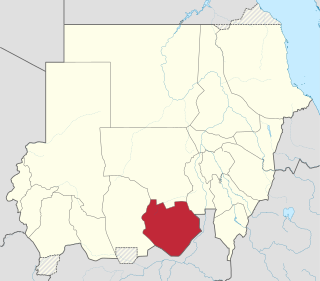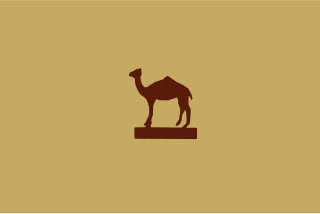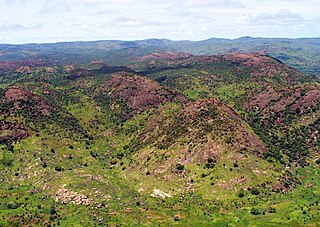The Dilling are an ethnic group of the Nuba peoples. The Dilling number 12,000 and live mainly in the Nuba Mountains of South Kordofan state, in southern Sudan.
The Dilling language is one of the Nubian languages of the Nilo-Saharan family. The Dilling language has become partially arabized. [ citation needed ]

The Kordofanian languages are a geographic grouping of five language groups spoken in the Nuba Mountains of the South Kordofan region of Sudan: Talodi–Heiban languages, Lafofa languages, Rashad languages, Katla languages and Kadu languages. The first four groups are sometimes regarded as branches of the hypothetical Niger–Congo family, whereas Kadu is now widely seen as a branch of the proposed Nilo-Saharan family.
The Nubian languages are a group of related languages spoken by the Nubians. In the past, Nubian languages were spoken throughout much of Sudan, but as a result of Arabization they are today mostly limited to the Nile Valley between Aswan and Al Dabbah. In the 1956 Census of Sudan there were 167,831 speakers of Nubian languages. Nubian is not to be confused with the various Nuba languages spoken in villages in the Nuba mountains and Darfur.

South Kordofan is one of the 18 wilayat or states of Sudan. It has an area of 158,355 km2 and an estimated population of approximately 1,100,000 people (2000). Kaduqli is the capital of the state. It is centered on the Nuba Mountains. At one time it was supposed that South Kordofan was the only state in (North) Sudan suitable for producing oil, but oil has also been discovered in neighboring White Nile State in larger quantities.

Lokichogio, is a town in the Turkana District in northwest Kenya. It is often called Loki for short. The town lies on the A1 road, and is served by the Lokichogio Airport.

Kordofan is a former province of central Sudan. In 1994 it was divided into three new federal states: North Kordofan, South Kordofan and West Kordofan. In August 2005, West Kordofan State was abolished and its territory divided between North and South Kordofan States, as part of the implementation of the Comprehensive Peace Agreement between the Government of Sudan and the Sudan People's Liberation Movement. West Kordofan was reestablished in July 2013.

The Nuba Mountains, also referred to as the Nuba Hills, is an area located in South Kordofan, Sudan. The area is home to a group of indigenous ethnic groups known collectively as the Nuba peoples. In the Middle Ages, the Nuba mountains had been part of the Nubian kingdom of Alodia. In the 18th century, they became home to the kingdom of Taqali that controlled the hills of the mountains until their defeat by Mahdi Muhammad Ahmad. After the British defeated the Mahdi army, Taqali was restored as a client state. Infiltration of the Messiria tribe of Baggara Arabs has been influential in modern conflicts. Up to 1.5 million people live in the mountains, mostly ethnic Nuba, with a small minority of Baggara.
The Nuba people are indigenous inhabitants of central Sudan. Nuba are various indigenous ethnic groups who inhabit the Nuba Mountains of South Kordofan state in Sudan, encompassing multiple distinct people that speak different languages which belong to at least two unrelated language families. Since 2011, when the southern part of Sudan became an independent state as South Sudan, the Nuba live in the southern part of Sudan. Estimates of the Nuba population vary widely; the Sudanese government estimated that they numbered 2.07 million in 2003.

The Temein languages, or Nuba Hills languages, are a group of Eastern Sudanic languages spoken in the Nuba Mountains of Sudan.
The Heiban Nuba are a people of the Nuba Mountains in South Kordofan state, in southern Sudan.
The Kadaru are a sub-ethnic group of the Nuba peoples in the Nuba Mountains of South Kordofan state, in southern Sudan. They live in the Kadaru Hills between Dilling and Delami in South Kurdufan.
The Moro Nuba are a sub-ethnic group of the Nuba peoples in the Nuba Mountains of South Kordofan state, in southern Sudan. Many members of this ethnicity are Christians. The population of this ethnic group was estimated at 72,000 people in 2017.
The Krongo Nuba are a sub-ethnic group of the Nuba peoples in the Nuba Mountains of South Kordofan state, in southern Sudan. They number several 10,000 persons. This minority is divided in terms of religion.
The Daju people are a group of seven distinct ethnicities speaking related languages living on both sides of the Chad-Sudan border and in the Nuba Mountains. Separated by distance and speaking different languages, at present, they generally have little cultural affinity to each other.
Afitti is a language spoken on the eastern side of Jebel el-Dair, a solitary rock formation in the North Kordofan province of Sudan. Although the term ‘Dinik’ can be used to designate the language regardless of cultural affiliation, people in the villages of the region readily recognize the terms ‘Ditti’ and ‘Afitti.’ There are approximately 4000 speakers of the Afitti language and its closest linguistic neighbor is the Nyimang language, spoken west of Jebel el-Dair in the Nuba Mountains of the South Kordofan province of Sudan.
The Hill Nubian languages, also called Kordofan Nubian, are a dialect continuum of Nubian languages spoken by the Hill Nubians in the northern Nuba Mountains of Sudan.
Dair is a moribund Hill Nubian language spoken in the northern Nuba Mountains in the south of Sudan. It was spoken by around 1,000 people in 1978 in the Jibaal as-Sitta hills, between Dilling and Delami.
Karko is a Hill Nubian language spoken in the northwestern Nuba Mountains in the south of Sudan. It is spoken by around 7,000 people in the Karko hills, 35 km west of Dilling, including Dulman, although Jakobi Angelika & Hamdan Ahma estimate the Karko population at up to 15,000 individuals, mostly in urban centers. Ethnologue reports that speakers of Karko are shifting to Sudanese Arabic.
Dilling is a Hill Nubian language spoken in the northwestern Nuba Mountains in the south of Sudan. It is spoken by around 11,000 people in the town of Dilling and surrounding hills, including Kudur. Ethnologue reports that Dilling is moribund, with only older adults speaking the language and not using it with their children. All speakers also use Sudanese Arabic. The Dilling call themselves Warki, while the Dilling speakers of Kudur call themselves Kwashe. Another ethnic minority that speak Dilling are the Debri people, an ethnic group of several thousand people from South Kurdufan in Sudan
Ghulfan is a Hill Nubian language spoken in the central Nuba Mountains in the south of Sudan. It is spoken by around 33,000 people in the Ghulfan Kurgul and Ghulfan Morung hills, south of Dilling. The villages in which the language is spoken are Dabri, Karkandi, Katang, Kurgul, Namang, Ninya, Moring, Ota, Shigda, and Tarda. It is closely related to Kadaru, with which it forms the Kadaru-Ghulfan subgroup of Hill Nubian.

The Nuba Mountains, located in the West Kordofan and South Kordofan states in the south of Sudan, are inhabited by a diverse set of populations speaking various languages not closely related to one another.